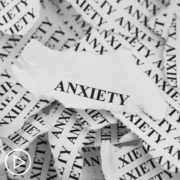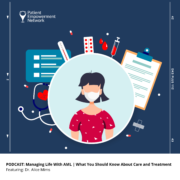Advice for Managing Lung Cancer Symptoms and Treatment Side Effects
Advice for Managing Lung Cancer Symptoms and Treatment Side Effects from Patient Empowerment Network on Vimeo.
Lung cancer expert Dr. Jyoti Patel explains common symptoms and treatment side effects, and discusses how treatment approaches may vary depending on treatment goals for each patient.
Jyoti Patel, MD, is Medical Director of Thoracic Oncology and Assistant Director for Clinical Research at the Robert H. Lurie Comprehensive Cancer Center of Northwestern University. She is also Associate Vice-Chair for Clinical Research and a Professor in the Division of Hematology and Oncology at Northwestern University Feinberg School of Medicine. Dr. Patel is a leader in thoracic oncology, focusing her efforts on the development and evaluation of novel molecular markers and therapeutics in patients battling non-small cell lung cancer. Learn more about Dr. Patel.
See More from Thrive Lung Cancer
Related Resources:

|

|

|
Transcript:
Katherine:
Symptoms and side effects can sometimes be a burden to patients undergoing treatment. What are the most common issues that patients face?
Dr. Patel:
So, common symptoms from treatment can include fatigue, lack of appetite, disinterest in the things that made you really excited before. Infrequently now we have severe nausea, because we have such good antinausea medications.
Sometimes we’ll have problems with blood counts or risks of infection. All of these vary by the treatment that’s rendered. And so, often it may be that you’re on a targeted therapy.
Some targeted therapies, for example, can cause swelling in your legs. Immunotherapies are generally well-tolerated but can cause significant side effects in a small minority of people that could include inflammation in the gut, for example.
So, everything is sort of tailored, I would say. Most frequently, I hear about the fatigue, and then the ongoing stressors of living with cancer. So, the financial toxicity certainly. These drugs are expensive. But not only that, often people have changed the way they work. Their family members have changed how they work to support their loved one. So, bringing people to appointments.
There’s a lot on someone’s plate. And that can contribute to fatigue and even some anxiety.
Katherine:
Yeah. What strategies are in place to manage symptoms and side effects?
Dr. Patel:
So, having a patient who’s knowledgeable about potential side effects and a good advocate for themselves is probably the best way to manage therapy. So, ongoing dialogue with your clinical team, with your nurse, with your physician, are absolutely important. But most of us work with teams of healthcare workers. And so, when I think about our clinic, we have financial counselors, we have social workers, we have dieticians and nutritionists, we work with physical therapists. And importantly, we work with a palliative care team that helps us, again, manage some of the toxicities of therapy.
We think that they provide a longitudinal assessment of patients and remember what’s most important to a patient over time. Whereas often in the moment there’s this, we want to make the tumor shrink. We think about what we can do immediately. It’s often really helpful to have another team that can provide support over the patient’s journey to help us, again, prioritize what they wanted to do the most.
Katherine:
Mm-hmm. Dr. Patel, why do you think it’s necessary for patients to tell their doctor about any issues they may be having? Even the little ones.
Dr. Patel:
I think most of us want to be good patients. And so, we minimize things because we think that, okay, we’re using precious time to talk about things that may seem minor. But, again, all of these add up.
Even minor symptoms, particularly in the era of immunotherapy, can turn out to be big problems. So, as I say now to my patients particularly on immunotherapy, if something seems a little bit off and you can’t put your finger on it, I just need to know so I can at least do the appropriate workup to make sure that we’re not missing anything. Because symptoms of underlying problems can be very misleading.
Moreover, I think the cumulative burden of cancer. So, again, we talked a little bit about the financial toxicity, the emotional cost, the time involved in treatment, all of that adds up. And you never want to get it to a breaking point. We want to manage it early on, so we can, again, make decisions together and keep wellness and the quality of survival at the forefront.










